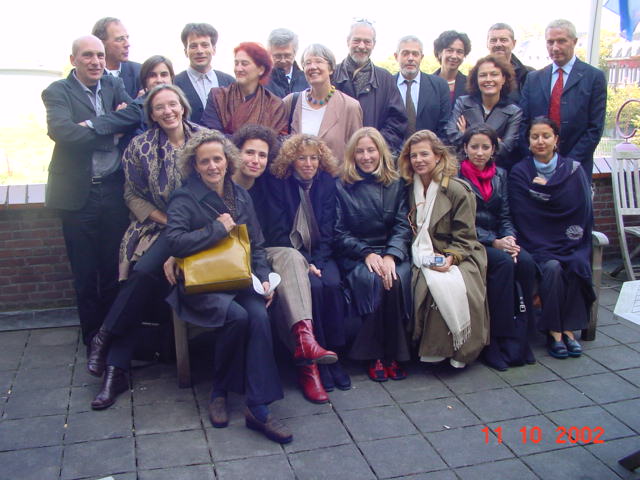- 2021 June First INCCA Cafe with INCCA Korea.
- 2021 May First INCCA Talk featuring Fernando Dominguez Rubio in conversation with Pip Laurenson about his new book Still Life: Ecologies of the Modern Imagination at the Art Museum.
- 2021 April Launch new programmes: INCCA Talks and INCCA Cafes.
2020
- 2020 September Two positions for early career members are established on the INCCA Steering Committee.
- 2020 July First vitual INCCA/CAN! Speed Mentoring Session during AIC.
2019
- 2019 November INCCA Speed Mentoring session during Future Talks in Munich.
- 2019 November Re-launch INCCA Asia Pacific group. Steering Committee renewed and group page updated.
- 2019 April Launch INCCA Korea.
- 2019 March INCCA Speed mentoring session during the MACCH conference, Maastricht.
2018
- 2018 November INCCA Mentoring programme carried out for the first time during the International Symposium Acting in Contemporary Art (SBMK Summit) and SBMK Day, the Netherlands.
- 2018 September Launch INCCA Mentoring programme.
2016
- 2016 September INCCA affiliated project: IIC Congress:Saving the Now: Crossing Boundaries to Conserve Contemporary Works
- 2016 June INCCA affiliated project: Keep it moving? Conserving kinetic art
2015
- 2015 December Launch new INCCA website.
- 2015 October PhD and Postdoc network changes name to CoCARe.
- 2015 September Launch INCCA Asia Pacific.
- 2015 INCCA North America becomes Voices in Contemporary Art (VoCA)
2013
- 2013 June INCCA affiliated project: ICOM-CC MMCA working group interim meeting: Conserving Outdoor Painted Sculpture (2003)
2010
- 2010 December Launch INCCA Iberoamerica. Group for Spanish and Portuguese speaking INCCA members.
- 2010 December Launch INCCA-f. Group for French speaking INCCA members.
- 2010 June Launch second thematic group: PhD and Postdoc Network.
2009
- 2009 December Launch first thematic group: INCCA Education; Launch INCCA Central and Eastern Europe.
- 2009 October INCCA presented in Sao Paulo, Brazil.
- 2009 May INCCA North America becomes non-profit organisation.
- 2009-2011 INCCA afffiliated project: PRACTICs which included the international symposium Contempory Art: Who Cares?
2008
- 2008 July: INCCA presented to conservator/restorers, curators, archivists and artists in Ireland.
2007
- 2007 December Launch INCCA Italy
- 2007 May INCCA presented in France at database workshop. The meeting was organised in collaboration with the Centre de recherche et de restauration des Musées de France (C2RMF) and hosted at Musée d’art contemporain du Val-de-Marne (MAC/VAL), Paris.
- 2007 March Network by-laws adopted.
2006
- 2006 December Launch INCCA Member website. Through this website members can:
- create and edit thier own records for the INCCA Database
- search the INCCA Database for Artists' Archives
- update their contact details
- search for INCCA members
- 2006 December Louise Cone (Statens Museum, Copenhagen) becomes INCCA Scandinavia coordinator.
- 2006 January Launch INCCA North America.
2005
- 2005 April Official formation of the INCCA Steering Committee.
2004
- 2004-2007 INCCA affiliated project: Inside Installations: Preservation and Presentation of Installation Art
- 2004 May INCCA presented in North America for the first time. The meeting was organised by Carol Stringari and took place in the Guggenheim's Sackler Center for Education, New York. IJsbrand Hummelen, Tatja Scholte and Alberto de Tagle (ICN) gave an INCCA Database workshop. On day 2, Caitlin Jones and Carol Stringari presented the Variable Media Questionnaire, which had been initiated and developed by Jon Ippolito, and further developed by Caitlin Jones and Alain Depocas.
1999 - 2002 Founding project
A group of 23 individuals from 11 organisations established INCCA; the founding project was supported by the European Commission’s Raphael Programme. During this project, the INCCA website and databases were developed and a substantial amount of artists’ information collected. Almost 100 hundred artists’ interviews were conducted and from this experience a Guide to Good Practice was created.
INCCA founding members:
-
Netherlands Institute for Cultural Heritage / ICN, Amsterdam
-
IJsbrand Hummelen, Tatja Scholte, Dione Sillé
-
-
Tate Gallery, London
-
Derek Pullen, Jo Crook, Bryony Bery, Jackie Heuman
-
-
Stedelijk Museum voor Actuele Kunst, Ghent
-
Frederika Huys
-
-
Restaurierungszentrum der Landeshauptstadt Düsseldorf
-
Cornelia Weyer & Gunnar Heydenreich
-
-
Solomon Guggenheim Museum, New York/Bilbao
-
Carol Stringari
-
-
Det Kongelige Danske Kunstakademi/ Konservatorskolen, Copenhagen
-
Mikkel Scharff, Bent Eshøy, Louise Cone
-
-
Fundacio ‘La Caixa’ / Centre Cultural de Barcelona
-
Cecilia Illa Malvehy
-
-
Galeria d’Arte Moderna, Turin
-
Antonio Rava
-
-
Academy of Fine Art / Faculty of Conservation and Restoration of Works of Art, Warsaw
-
Iwona Szmelter, Monika Jadzinska
-
-
Museum Moderner Kunst / Stiftung Ludwig, Vienna
-
Hester Stoebe
-
-
Foundation for the Conservation of Contemporary Art / SBMK, The Netherlands
-
Andrée van de Kerckhove (Kröller-Müller Museum), Vincent de Keyzer (Gemeentemuseum Den Haag), Christiane Berndes (Van Abbemuseum), Lydia Beerkens (private conservator, on behalf of the Van Abbemuseum)
-
1997
Modern art conservators and curators from all over the world participated in the Amsterdam symposium ‘Modern Art: Who Cares?’. Participants at the symposium agreed to share their knowledge and experience, and to collaborate in collecting new information by means of artists’ interviews. A book of the same name was published in 1999 and consists of a comprehensive description of case studies from the project ‘Conservation of Modern Art’ and the decision-making and registration models developed. It also includes the entire texts of the symposium, lectures, forums and seminars.
